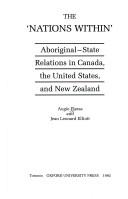| Listing 1 - 10 of 10 |
Sort by
|
Book
ISBN: 1554589541 9781554589548 9781554589555 155458955X 9781554589531 1554589533 Year: 2014 Publisher: Waterloo, Ontario
Abstract | Keywords | Export | Availability | Bookmark
 Loading...
Loading...Choose an application
- Reference Manager
- EndNote
- RefWorks (Direct export to RefWorks)
In acknowledging the possibility that as the world changes so too does racism, this book argues that racism is not disappearing, despite claims of living in a post-racial and multicultural world. To the contrary, racisms persist by transforming into different forms whose intent or effects remain the same: to deny and disallow as well as to exclude and exploit. Racisms in a Multicultural Canada is organized around the assumption that race is not simply a set of categories and that racism is not just a collection of individuals with bad attitudes. Rather, racism is as much a matter of interests as of attitudes, of property as of prejudice, of structural advantage as of personal failing, of whiteness as of the "other," of discourse as of discrimination, and of unequal power relations as of bigotry. This multi-dimensionality of racism complicates the challenge of formulating anti-racism and anti-colonialist strategies capable of addressing it. Employing a critical framework that puts politics and power at the centre of analysis, this book focuses on why racisms proliferate, how they work in contemporary societies, and how the way we think and talk about racism changes over time. Specifically, it examines the working of contemporary racisms in a multicultural Canada that claims to abide by principles of multiculturalism and a commitment to a post-racial society
Racism --- Canada --- Race relations.
Book
ISBN: 9781433176364 143317636X Year: 2021 Publisher: New York, NY Peter Lang Publishing, Inc.
Abstract | Keywords | Export | Availability | Bookmark
 Loading...
Loading...Choose an application
- Reference Manager
- EndNote
- RefWorks (Direct export to RefWorks)
"Universities and colleges like to self-idealize as relatively neutral and value-free sites of higher learning. In reality, the idea of the Westernized academy is deeply embedded in a Eurocentric logic that not only excludes alternative forms of knowledge and knowing, but also remains racialized, gendered, and sited in coloniality with respect to governance, scholarship, and entitlements. Efforts to address this gap between the ideal and reality have tended toward diversifying the academy through multicultural initiatives in diversity, inclusion, and equity. However helpful as a first step, these interventions are insufficient in generating the kind of substantive changes that would abort the academy's crisis of legitimacy. Moves to decolonize, ungender, and deracialize the academy will require a commitment to the transformative principles of inclusivity, including a focus on those root causes associated with structural barriers and systemic biases. It remains to be seen if the academia can rise to the challenge of deEurocentrizing the idea of the academy along postEurocentric lines, while engaging the emergent demands and evolving realities of a postmulticultural world"--
Universities and colleges --- Multicultural education --- Educational equalization --- Social aspects --- Education, Higher --- Eurocentrism --- Aims and objectives
Book
ISBN: 9789004532946 9004532943 9004532927 9004532935 Year: 2023 Publisher: Leiden, The Netherlands ; Boston : Brill,
Abstract | Keywords | Export | Availability | Bookmark
 Loading...
Loading...Choose an application
- Reference Manager
- EndNote
- RefWorks (Direct export to RefWorks)
The politics of racism have returned with a bang. What was once a whisper is now a roar in the wake of public outrage over charges of police racism that claimed the lives of racialized minorities and Indigenous peoples. Yet confusion and uncertainty unsettle the challenge of clarifying the nature and scope of racism in general, systemic racism in particular, resulting in a glaring disconnect between public perceptions and lived experiences. Reckoning with Racism is themed around the prospect of problematizing the idea of racism as articulated, understood, and debated in response to new realities, emergent demands, and contested dynamics. A profoundly new racism world is evolving, one so fundamentally different from the iterations of the past, as to trigger a foundational shift in reconceptualizing how see, think and talk about and act on racism. Changing the conversation on racism must also acknowledge its uncanny knack of reinventing itself, while intersecting with other axes of identity and differentiation to amplify the inequalities of exclusion.
Education. --- Culture & Education. --- Social Justice. --- Inclusive Education. --- Educational anthropology. --- Social justice. --- Inclusive education.
Book
ISBN: 9789004466562 9789004461161 Year: 2021 Publisher: Leiden; Boston : BRILL
Abstract | Keywords | Export | Availability | Bookmark
 Loading...
Loading...Choose an application
- Reference Manager
- EndNote
- RefWorks (Direct export to RefWorks)
The multiculturalization of Canada has catapulted it into the front ranks of countries in advancing a principled diversity governance. Fifty years after the inception of a multicultural governance model that seemingly works and is relatively popular, Canada remains one of the few countries in the world to believe in multiculturalism. Yet the irony is inescapable: Notwithstanding its lofty status as a Canadian icon and an aspirational ideal, an official multiculturalism remains misunderstood both in Canada and abroad in terms of what it means, how it works and for whom, and why it endures. If anything, as the book explains, the idea of multiculturalism remains shrouded in the conceptual fog of a 'riddle wrapped in a mystery inside an enigma'. An interplay of polite fictions that mask inconvenient truths puts the onus on deconstructing Canadian multiculturalism by conceptualizing strengths (including a probe into why multiculturalism ostensibly works in Canada but rarely elsewhere), analyzing weaknesses, critically assessing its worth, and envisioning its future in responding to the new realities and demands of a post-multicultural world. That Canada's multiculturalism remains a work in progress, albeit one with innovative possibilities, provides a fitting tribute.
Ethnicity --- Minorities --- Multiculturalism --- National characteristics, Canadian --- Government policy
Book
ISBN: 9780774826808 9780774826792 Year: 2015 Publisher: Vancouver : University of British Columbia Press,
Abstract | Keywords | Export | Availability | Bookmark
 Loading...
Loading...Choose an application
- Reference Manager
- EndNote
- RefWorks (Direct export to RefWorks)
Book
ISBN: 900470468X Year: 2024 Publisher: Leiden, Netherlands : BRILL,
Abstract | Keywords | Export | Availability | Bookmark
 Loading...
Loading...Choose an application
- Reference Manager
- EndNote
- RefWorks (Direct export to RefWorks)
Older adults may be the world's fastest growing demographic. Yet they remain vulnerable to biases and barriers that would be intolerable if directed at others. Such an indictment puts the onus on deconstructing the idea of ageism in terms of what it means ("a riddle"), how it works ("a mystery"), why it persists ("an enigma"), and what can be done about it ("a puzzle"). Reference to ageism must go beyond the idea of a "bug" in the system. Rather, ageism is the system, the default reality of an ageist society designed by, for, and about the young and able-bodied. Ageism also intersects with other forms of identity and inequality such as gender and race to amplify the downside of getting older and being old. Initiatives for advancing a rights-based, age-inclusive society must focus on calling out ageism as a precondition for calling in a national reset.

ISBN: 0195407547 Year: 1992 Publisher: Toronto Oxford university press
Abstract | Keywords | Export | Availability | Bookmark
 Loading...
Loading...Choose an application
- Reference Manager
- EndNote
- RefWorks (Direct export to RefWorks)
Indians of North America --- Indigenous peoples --- Maori (New Zealand people) --- Government relations --- Politics and government
Book
ISBN: 0774820853 077482087X 1280596767 9786613626592 Year: 2011 Publisher: UBC Press
Abstract | Keywords | Export | Availability | Bookmark
 Loading...
Loading...Choose an application
- Reference Manager
- EndNote
- RefWorks (Direct export to RefWorks)

ISBN: 094752228X 0947522298 1877276537 Year: 2005 Publisher: Dunedin Otago University Press
Abstract | Keywords | Export | Availability | Bookmark
 Loading...
Loading...Choose an application
- Reference Manager
- EndNote
- RefWorks (Direct export to RefWorks)
Digital

ISBN: 9783839410349 9783837610345 Year: 2015 Publisher: Bielefeld transcript Verlag
Abstract | Keywords | Export | Availability | Bookmark
 Loading...
Loading...Choose an application
- Reference Manager
- EndNote
- RefWorks (Direct export to RefWorks)
| Listing 1 - 10 of 10 |
Sort by
|

 Search
Search Feedback
Feedback About UniCat
About UniCat  Help
Help News
News